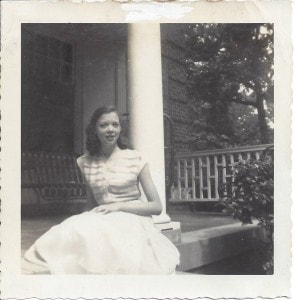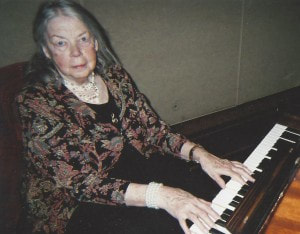 Coleen age 15 on Burwell Bldg porch Coleen age 15 on Burwell Bldg porch The sixth of seven children from a Nash County family wracked by death, illness and other “sad circumstances,” Colleen Bunting came to Methodist Orphanage at age 7. Her younger brother, Stanley, arrived two months later. Moving to the Raleigh campus: I remember that day like it was yesterday. It was March 17, on a Friday. I was living, temporarily as it turned out, with an aunt (one of my mother’s sisters). I knew in advance that I was going to move to the orphanage in Raleigh. I don’t recall referring to it as Methodist Orphanage. I went to school that day, same as I had the whole week. The school was some distance from me (it seemed to me), and I walked to and from school each day. I knew that I would be leaving my aunt’s house soon after I got back from school. She had my small box of belongings packed, and my late father’s first cousin, James A. Glover, arrived soon after I got back from school. There were very few clothes in the small box. The toy that I distinctly recall carrying to Raleigh with me was a stand-up girl doll, about 18 inches tall, with black hair and a blue dress. Santa Claus had brought it to me the previous Christmas. He brought an identical doll to the 4-year-old daughter of my aunt—except for the hair being blonde and the dress being pink. I recall that I had 29 cents (a quarter and four pennies).
The last day at school we had a writing assignment, and I recall that I wrote, “I am going to be moving to Rolley.” Well, at least, I spelled Raleigh phonetically. One of the girls in the class was my first cousin (the daughter of another of my mother’s sisters). It was time for the school day to end, and the students were lined up to pass by the teacher’s desk to get graded papers to take home. My cousin was in front of me. I was excited about the chance to tell the teacher that I would be moving to “Rolley.” In hindsight, she probably already knew that. Anyway, my cousin passed by the teacher before I did and promptly said to the teacher something like, “Colleen’s going to the arfnage.” She didn’t pronounce orphanage much better than I spelled Raleigh. I was sort of disappointed that I wasn’t the one to tell the teacher I was moving. Memories of summertime: One of my many memories is how, as a younger student (1st through 4th grades) in the summer, I was told to go to the vegetable porch off the dining hall, where there would be 3 or 4 bushels of string beans, butterbeans or peas. There, under the supervision of an older girl, we would spend a couple hours snapping string beans or shelling butterbeans or peas. The older girl would fill our lap with vegetables but, of course, being small, the front of our little dresses wouldn’t hold much. At the time, though, it seemed like a lot. As we finished one lapful, the older girl would fill it again. We were always happy to finish so we could go play. The vegetables would sometimes come from the MO garden; other times by way of donation. A lasting impression: Mary Y. Allred was the head matron as well as the house parent for the Vann Building. She would do things for us that I thought were special and gave us something to look forward to. For instance, she would keep our money for us in individual envelopes labeled with our names. In the warm months, on Saturday afternoons, she would give each of us a dime of our money and let us go to the Milky Way (a nearby store). A dime doesn’t sound like much, but it would buy what seemed like a lot of penny candy. Another thing she would do was take us once a year to the S&W Cafeteria in downtown Raleigh. One year, though, in advance of this outing, Mrs. Allred observed that some of us (I was one of them) had stain on our hands from green pecan hulls. She stated that any of us who had pecan stain on our hands would not be allowed to go to the S&W Cafeteria. In later years, I wondered if the logic was to keep us away from the green pecans long enough to allow them to ripen or if she was embarrassed to take us to the cafeteria with pecan hull stain on our hands. Whatever—it sure kept me away from the green pecans, because I wanted to go to the S&W Cafeteria. That was too good an outing to miss! When the MO menu included boiled potatoes, Mrs. Allred would always take a bowl of potatoes back to the building. Her living quarters had a small kitchen. She would re-do the boiled potatoes and bring them back to the table at suppertime. The tables seated six, so there was only enough of the redone potatoes for those of us at her table. I never knew what she did to give the boiled potatoes a “new personality.” Whatever it was, though, they were delicious. Apparently, she added some black or red pepper, because some of the girls would say, “they’re hot.” I always liked those recycled potatoes. Sometimes Mrs. Allred would put whole milk in a quart jar for the purpose of making butter, and she would “select” me to shake the jar. They are some things I remember about Mrs. Allred that made me think of her as loving and kind. More on campus life: There was a large bell situated on top of the laundry building, and it was the campus “alarm clock.” The bell was rung by pulling a long rope that was attached. Ringing of the bell signaled the daily scheduled events, with the first bell ringing a wake-up call at 6:15 a.m. The bell ringing for meals was at 6:30 a.m. breakfast, 12 p.m. lunch, 6 p.m. supper. The MO girls and boys gathered in the large dining room for all meals. Superintendent A. S. Barnes, known as “Daddy Barnes” had his own special way of summoning us as we strolled across campus in that direction. Perhaps he was trying to get us to move a little faster. He would sometimes stand on the dining room porch and raise his hand in a summoning “come on” way and would shout out as if he were a conductor on a train: “Board, board, all aboard. If you can’t get a board, get a plank. Board, board.” When all of the girls and boys were in the dining room Supt. Barnes (and the other superintendents that followed him) would stand in the front center, indicating it was time for the blessing. The dining room matron would then pick up a medium-size “duty bell” and ring it a couple or so times to signal the girls and boys to get quiet for the blessing. Supt. Barnes (or superintendents that followed him) would lead us in saying, “For this and all thy gifts of love, we give thee thanks and praise. Amen.” Sometimes Supt. Barnes would precede the blessing with some words of wisdom or advice. One particular time for advice would be when the NC State Fair came to Raleigh. Those of us who wanted to go could go to the fair. We would be transported to and from the fair on the farm truck the orphanage owned. Some of the girls and boys would have a few dollars, perhaps saved up for the fair or maybe some money received from a relative specifically for the fair. Supt. Barnes’ advice to us would be something like, “Now, don’t go to the fair and throw all your money away.” Duties as assigned: I was a “sewing room girl” in 5th, 7th and 8th grades. Sewing room duty amounted to mending clothes. Each building had a certain day designated to send clothes that needed mending to the sewing room. Believe it or not, when I was first assigned to the sewing room I could put in a really good patch. I think, apparently, sewing just came naturally to me. The problem was, though, that I only knew how to put in a square patch. So, if a pair of jeans came to the sewing room with a small (maybe size of a quarter) hole in the knee, and I got that pair of jeans to mend, I would transform that small round hole into a sizeable (larger than a quarter) square and make a square patch. One of the “brothers” still laughs about that today. More about Colleen: Colleen made a lot of memories in her nine years at MO. The place and its people gave her stability, love and encouragement at a low point in her childhood. In time, the other girls and boys on campus became her siblings, and the values she learned became lifelong guideposts. In 1953, Colleen graduated high school and launched her adult life with business classes, marriage to Garland Bunting and motherhood, parenting children Joan and Carey (who died at age 7). She and Garland, now deceased, moved to Scotland Neck to raise their family and she worked jobs as varied as bus driver, teacher, newspaper writer and church pianist/organist. — Peter MacBeth
1 Comment
Ronald Kovacs
11/7/2019 08:14:07 pm
I met both Colleen and her husband Garland in 1990. They were the nicest people I have ever known. Always friendly and happy to see me whenever I passed through Scotland Neck. It was an honour and privilege to have known them.
Reply
Leave a Reply. |
Archives
July 2023
Categories |

 RSS Feed
RSS Feed
